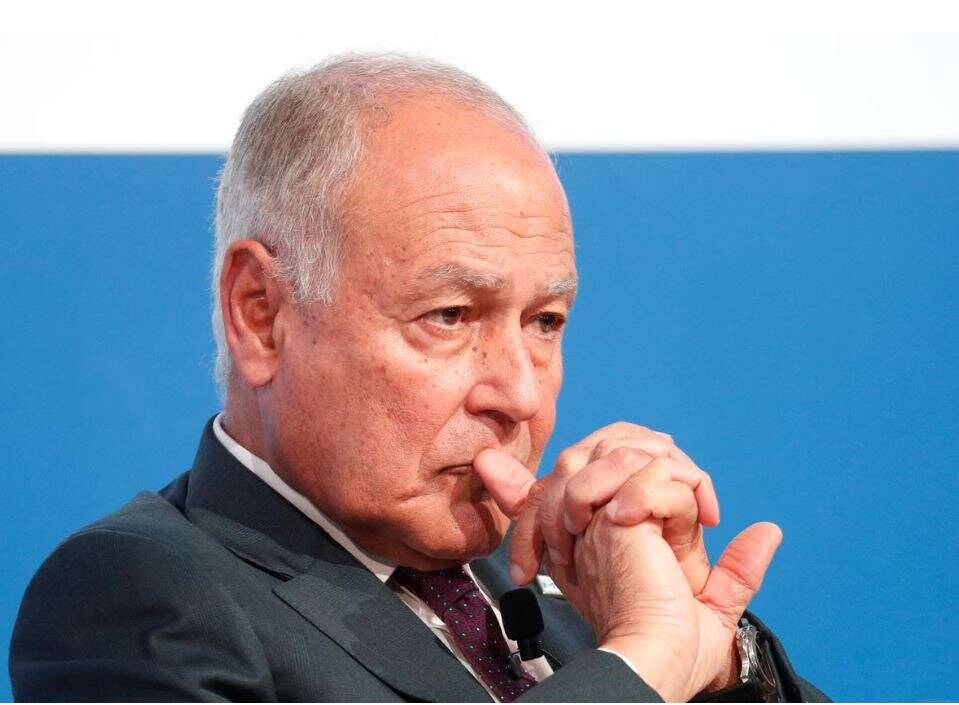The head of the Arab League warned a high-level UN meeting Wednesday that Israeli application of sovereignty in parts of the West Bank would inflame tensions and endanger peace in the Middle East, and could ignite "a religious war in and beyond our region."
Ahmed Aboul Gheit, head of the 22-member organization, said annexation will also have "broader ramifications on the international security around the world."
Follow Israel Hayom on Facebook and Twitter
"If implemented, Israeli annexation plans would not only be detrimental to the chances of peace today but will destroy any prospects for peace in the future," he told the Security Council. "Palestinians will lose faith in a negotiated solution, I'm afraid Arabs too will lose interest in regional peace. A new dark reality will set in vis-à-vis this conflict and in the region at large."
The council meeting came days ahead of the July 1 date that Prime Minister Benjamin Netanyahu's coalition deal allows a sovereignty plan to be presented.
Israel's UN Ambassador Danny Danon told the council that "should Israel decide to extend its sovereignty, it would be doing so with respect to areas over which it has always maintained a legitimate historical and legal claim."

UN Secretary General Antonio Guterres opened the meeting with a call on Israel to abandon its sovereignty plans, an appeal echoed by almost all other speakers including half a dozen ministers and deputy ministers.
The UN chief said the application of sovereignty "would constitute a most serious violation of international law, grievously harm the prospect of a two-state solution and undercut the possibilities of a renewal of negotiations."
Guterres urged the United States, the European Union, and Russia to swiftly take up their mediation role along with the United Nations as part of the Quartet "and find a mutually agreeable framework for the parties to re-engage, without preconditions, with us and other key states."
He also urged Israeli and Palestinian leaders "to commit to meaningful dialogue, with the support of the international community." And he encouraged regional and international supporters of a two-state solution to help bring the parties back to a "path towards a negotiated, peaceful settlement."
EU foreign policy chief Josep Borrell backed Quartet action in a letter to the Security Council writing, "Unilateral annexation would inevitably have legal consequences for the international community's relations with Israel." A joint statement by six current and incoming European members of the Security Council said "annexation would have consequences for our close relationship with Israel and would not be recognized by us."
Palestinian Foreign Minister Riad al-Malki said "we will stop acting as the Palestinian Authority" the moment Netanyahu declares "the annexation of one centimeter or 30% of the West Bank."
That means that full responsibility for the well-being and services for 4.5 million Palestinians will be turned back to Israel as the occupying power according to the Geneva conventions, he told the council and a press conference afterward.
Trump's Mideast plan, unveiled in January, envisions leaving some 30% of the West Bank territory under permanent Israeli control while giving the Palestinians expanded autonomy in the rest of the area. The Palestinians have rejected the plan, saying it is unfairly biased toward Israel.
With Trump's re-election prospects uncertain this November, Israeli hard-liners have urged Netanyahu to move ahead with the application of sovereignty quickly.
Al-Malki said deliberations have been taking place in the White House on the sovereignty issue for the last two days.
"Everybody knows that if there is anyone who could really stop Netanyahu from annexation ... it's the Trump administration," he said. "We hope that the Trump administration will give clear instructions to Netanyahu not to go ahead with annexation, and to open up the opportunity for potential resumption of negotiations between the Palestinians and the Israelis."
Subscribe to Israel Hayom's daily newsletter and never miss our top stories
Senior Palestinian officials gathered Wednesday in the Jordan Valley. The prime minister appealed to the international community and US and Israeli officials with "the loudest voice" to stop the Israeli plan.
Prime Minister Mohammad Shtayyeh stated: "Some say partial annexation. Some say full annexation. We will not accept any kind of annexation. We will not concede one centimeter of this land."
US Ambassador Kelly Craft said many council members "have concerns with this issue of the potential extension of Israeli sovereignty in the West Bank."
"At the same time, we ask that you also hold the Palestinian leadership accountable for acts they are responsible for," she said. Craft urged Palestinian leaders to look closely at Trump's plan "and engage us," stressing that "it is an opening offer."




